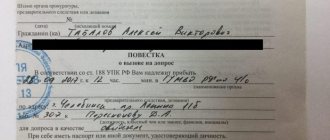New edition of Art. 164 Code of Criminal Procedure of the Russian Federation
1. Investigative actions provided for in Articles 178, Part Three, 179, 182 and 183 of this Code are carried out on the basis of a decision of the investigator.
2. In the cases provided for in paragraphs 4-9, 11 and 12 of part two of Article 29 of this Code, investigative actions are carried out on the basis of a court decision.
3. Carrying out investigative actions at night is not allowed, except in urgent cases.
4. When carrying out investigative actions, the use of violence, threats and other illegal measures, as well as creating a danger to the life and health of the persons participating in them, is unacceptable.
4.1. When carrying out investigative actions in criminal cases of crimes provided for in Articles 159 parts one - four, 159.1 - 159.3, 159.5, 159.6, 160, 165 and 201 of the Criminal Code of the Russian Federation, if these crimes are committed by an individual entrepreneur in connection with his business activities and (or) management of property belonging to him, used for the purposes of entrepreneurial activity, or if these crimes were committed by a member of the management body of a commercial organization in connection with the exercise of his powers to manage the organization or in connection with the implementation of entrepreneurial or other economic activities by a commercial organization, as well as Articles 159 parts of the fifth - seventh, 171, 171.1, 171.3 - 172.2, 173.1 - 174.1, 176 - 178, 180, 181, 185, 185 - 185.4 and 190 - 199.4 of the Criminal Code of the Russian Federation, unreasonable use of measures that may lead to suspension is not allowed to lead legal activities of legal entities or individual entrepreneurs, including the unreasonable seizure of electronic storage media, except for the cases provided for in part one of Article 164.1 of this Code. During investigative actions, it is also not allowed to seize a special declaration filed in accordance with the Federal Law “On the voluntary declaration by individuals of assets and accounts (deposits) in banks and on amendments to certain legislative acts of the Russian Federation”, and (or) documents and information attached to the said declaration.
5. The investigator, inviting participants in criminal proceedings specified in Chapters 6 - 8 of this Code to participate in investigative actions, verifies their identity, explains to them their rights, responsibilities, as well as the procedure for carrying out the corresponding investigative action. If a victim, witness, specialist, expert or translator participates in the investigative action, he is also warned of the responsibility provided for in Articles 307 and 308 of the Criminal Code of the Russian Federation. If an investigative action in a criminal case against accomplices of a crime involves a person in respect of whom the criminal case has been separated into separate proceedings in connection with the conclusion of a pre-trial agreement on cooperation with him, then he is warned about the consequences of failure to comply with the conditions and non-fulfillment provided for in Chapter 40.1 of this Code obligations stipulated by the pre-trial cooperation agreement, including in the case of deliberate reporting of false information or deliberate concealment of any significant information from the investigation.
6. When carrying out investigative actions, technical means and methods of detecting, recording and seizing traces of a crime and material evidence may be used. Before the start of an investigative action, the investigator warns the persons participating in the investigative action about the use of technical means.
7. The investigator has the right to involve an official of the body carrying out operational investigative activities in participation in the investigative action, about which a corresponding note is made in the protocol.
8. During the investigative action, a protocol is kept in accordance with Article 166 of this Code.
Commentary on Article 164 of the Code of Criminal Procedure of the Russian Federation
1. The commented article contains rules that apply to all investigative actions and make it possible to unify the procedure for their production. These rules should not be confused with the general conditions of the preliminary investigation, which are the most important requirements that arise from the content of the principles of criminal proceedings and regulate the most important aspects of the pre-trial process.
2. Parts 1–2 of the commented article contain a list of investigative actions, the implementation of which requires an order from the investigator or a court decision. In all other situations, the decision to carry out one or another investigative action does not require documentation.
3. Based on the resolution, investigative actions are carried out as provided for in the following articles of the Code of Criminal Procedure of the Russian Federation: Part 3 of Art. 178 (examination of the corpse, which is preceded by its exhumation, if close relatives of the deceased do not object to this); Art. 179 (examination); Art. 182 (search, with the exception of a search in a home); Art. 183 (excavation, with the exception of excavation in a dwelling).
4. A court decision is required when carrying out investigative actions specified in paragraphs 4–9 and 11 of Part 2 of Art. 29 Code of Criminal Procedure of the Russian Federation. These include investigative actions regulated by articles of the Code: Part 5 of Art. 177 (inspection of a home in the absence of the consent of the persons living in it); Part 3 Art. 182 (search of home); Part 2 Art. 183 (excavation in a dwelling); Part 3 Art. 183 (seizure of items containing state and other secrets protected by law, as well as items and documents containing information about deposits and accounts of citizens in banks and other credit organizations); Art. 184 (personal search, except for the cases provided for in Article 93 of the Code); Art. 185 (seizure of correspondence, its inspection and seizure in communication institutions); Art. 186 (monitoring and recording of telephone and other conversations); Art. 186.1 (obtaining information about connections between subscribers and (or) subscriber devices). At the same time, it should be emphasized that the seizure of property, although indicated in the list of investigative actions (clause 9, part 2, article 29), according to art. 115 of the Code of Criminal Procedure of the Russian Federation refers to measures of procedural coercion.
5. Part 3 of the commented article establishes a rule according to which investigative actions are not allowed at night. This prohibition is due to the fact that the very performance of a number of investigative actions (interrogation, confrontation, etc.) at night has a negative impact on the interrogated person.
Night time is the time period from 22:00 to 6:00 local time (Clause 21, Article 5 of the Code of Criminal Procedure of the Russian Federation). An exception to this rule is urgent cases, when a delay in carrying out an investigative action may lead to the irretrievable loss of evidence.
6. The prohibition established in Part 4 of the commented article to use violence, threats and other illegal measures during investigative actions, as well as to create a danger to the life and health of the persons participating in them, specifies the requirements of the principle of respect for the honor and dignity of the individual (Article 9 of the Code of Criminal Procedure of the Russian Federation) . In addition, this prohibition is specified in other articles related to the preliminary investigation. So, according to Part 3 of Art. 170 of the Code of Criminal Procedure of the Russian Federation, investigative actions can be carried out without the participation of witnesses if this is associated with a danger to the life and health of people. Conducting an investigative experiment in accordance with Art. 181 of the Code is permitted if there is no danger to the health of the persons participating in it.
7. The addition of a new part 41 to the commented article is caused by the need to create appropriate conditions for business activities that do not contradict the law.
8. Part 5 of the commented article establishes an algorithm for the actions of the investigator to ensure the rights of participants in criminal proceedings during each investigative action. These rules follow from the content of the principle of protecting the rights and freedoms of man and citizen in criminal proceedings (Part 1 of Article 11 of the Code of Criminal Procedure of the Russian Federation). At the same time, the investigator must not only explain to individuals the rights they have, but also ensure their full implementation.
9. For violation of the rules or failure to comply with the lawful requirements placed on them, participants in investigative actions bear responsibility established by law. In addition, a person in respect of whom a criminal case has been separated into separate proceedings in connection with the conclusion of a pre-trial cooperation agreement with him is warned that if he does not comply with the terms of the agreement and fails to fulfill his obligations, the prosecutor has the right to change or terminate such an agreement (Part 5 of Art. 317.4 Code of Criminal Procedure of the Russian Federation).
10. According to Part 6 of the commented article, during investigative actions, technical means and methods of detecting, recording and seizing traces of a crime and material evidence may be used. The fact of such use must be reflected in the protocol of the investigative action (Part 8 of Article 166 of the Code of Criminal Procedure of the Russian Federation). The use of technical means (for example, video recording) in itself does not replace the protocol of the investigative action, and the media are an appendix to the corresponding protocol. The protocol and its annex are the only evidence. If the results of the use of technical means were lost, then a certificate must be attached to the protocol of the investigative action, which indicates the reasons for such loss.
11. Part 7 of the commented article provides the investigator with the opportunity to involve an official of the body carrying out operational investigative activities in participation in the investigative action. This is advisable in cases where it is necessary to obtain assistance in inspecting the scene of an incident, during a search, seizure, investigative experiment, checking evidence on the spot, etc. In any case, this is reflected in the protocol in order to subsequently avoid complaints about the use of illegal methods of influence against participants in the investigative action.
Legal requirements
As established by part three of Art. 164 of the Code of Criminal Procedure of the Russian Federation, procedural activities cannot be carried out at night. An exception is provided only for those that do not require delay. Initial investigative actions, as well as all work of authorized persons, must be carried out only within the framework of the law. In this regard, procedural events should not be accompanied by violence, threats, or the use of other illegal measures, including those that create danger for the participants.
Principles for carrying out activities
The general rules for carrying out investigative actions reflect the content of legal requirements. They presuppose the humanism of norms and act as provisions that, as a rule, apply to all activities provided for by the Code. The meaning of the rules is determined, in fact, by the very essence of the investigative actions carried out, during which evidence is identified and secured. They apply to different parties to the process and apply to all persons involved in it.
Direct prohibitions
During investigative actions, the use of physical or mental violence, threats, other illegal measures, or creating a danger to the health/life of participants or other persons is not permitted. The Criminal Code establishes liability for illegal actions of law enforcement officers. In particular, penalties are provided for forcing citizens to testify. We are talking not only about witnesses, suspects, victims. Pressure on an expert, blackmail, the use of violent methods, torture, bullying, etc., are not allowed.
Technical means
Currently, they are increasingly used in investigative actions. Modern technical means allow you to quickly and reliably record the information received. The legislation does not define a list of devices that an investigator can use. Accordingly, technical means can be very different. Their main purpose is to detect, record and seize traces, as well as material evidence. All technical means, of course, must comply with security requirements and allow the information received and discovered during the event to be recorded objectively, without any distortion. The law requires preliminary notification of participants in investigative actions about the use of special equipment or devices.
Important points
The decision to carry out an investigative action is made by the investigator. However, the law does not require its presentation in any separate document. But when carrying out actions that significantly affect the interests and rights of organizations and individuals, the investigator must make an appropriate decision. This document, for example, is necessary when making decisions on the exhumation of a corpse, search, examination, or seizure. Paragraphs 11-12, 4-9 of Article 29 of the Code stipulate cases when the basis for carrying out investigative actions is a court decision. At the same time, lawyers note that this norm does not list all the activities for which such a resolution is necessary. For example, exhumation of a body is not indicated in the absence of consent from relatives. Experts also note that reference to the provisions of Article 29 significantly expands the concept of “investigative action.” In fact, according to lawyers, this instruction allows us to identify it with a procedural action performed as part of a preliminary investigation. This, according to experts, does not quite correspond to the title of Article 164.
Interim measures
In the production of investigative actions, different subjects of legal proceedings may be involved from both the prosecution and the defense. In addition, an authorized officer may involve an employee of the structure carrying out operational investigative work. In the process of each investigative action, the investigator must implement interim measures against the participants. Having confirmed their identities, the employee lists and explains to them the content of their duties and rights, and warns individuals about liability under Articles 307 and 308 of the Criminal Code. The protocol must contain the signature of each participant stating that everything was explained to them.
Specifics
All permissible types of investigative actions are established by law. Law enforcement officers, therefore, cannot carry out activities not provided for in the regulations. Investigative actions must be distinguished from other procedures provided for by procedural legislation. First of all, the measures under consideration are aimed at obtaining information about facts that are subject to further proof. Each circumstance is confirmed/refuted in the prescribed manner. The law establishes the rules by which an investigator can obtain this or that evidence. At the same time, each action requires the implementation of specific procedures. They ensure that the required evidence is obtained, the process and results of the event are reflected in the protocol. This document must be signed by all participants in the procedural event.
Procedure structure
Considering Art. 164 of the Code of Criminal Procedure of the Russian Federation with comments from lawyers, it can be noted that experts pay attention to the peculiarities of the procedural event carried out by the investigator. There are several stages in it:
- search;
- fixing;
- certifying.
At the same time, the set goals must be achieved while strictly observing and ensuring the rights and interests of the participants in the process. The initial stage involves identifying specific persons involved in the production of the action. As mentioned above, their responsibilities and rights are explained to them, and they are notified of the use of technical means. Depending on the status of the subjects, they are warned about the consequences of violating legal requirements. The content stage of the action includes conducting search activities. In addition, the information that was discovered is consolidated. The end of investigative actions is associated with recording the information in the protocol. Participants can familiarize themselves with the document and express their objections. If subjects have doubts regarding certain facts reflected in the protocol, an appropriate note is made in it.
Bibliography
- See: Decree of the President of the Russian Federation dated May 9, 2017 No. 203 “On the Strategy for the Development of the Information Society in the Russian Federation for 2022 - 2030” // Collection. Russian legislation Federation. 05/15/2017. No. 20. Art. 2901.
- See: Putin: investigators must be prohibited from seizing servers and hard drives of enterprises. URL: https://tass.ru/obschestvo/4459762 (access date: 03/12/2020).
- See: Collection. Russian legislation Federation. 12/31/2018. No. 53 (part I). Art. 8459.
- See: URL: https://www.susu.ru/ru/news/2019/06/26/uchenyy-yui-prinyal-uchastie-v-nauchno-prakticheskoy-konferencii-v-kazani (date of access: 12.03. 2020).
- See: Grigoriev V.N. Seizure of electronic storage media - expert opinion. URL: https://www.ritvus.ru/news/izjatie_ehlektronnykh_nositelej_informacii_ehkspertnoe_zakljuchenie_grigorev_v_n_moskva/2019-10-08-231 (access date: 03/12/2020).
- See: GOST 2.051-2013 “Unified system of design documentation. Electronic documents. General provisions" // Adopted by the Interstate Council for Standardization, Metrology and Certification. Minutes dated August 28, 2013 No. 58-P.
- See: Peryakina M.P., Unzhakova S.V., Shishkina N.E. Procedural and forensic aspects of seizure of electronic storage media in the light of protecting the rights of participants in criminal proceedings // Siberian Legal Bulletin. 2022. No. 3 (86). pp. 81-85.
Classification
The law provides for the following types of investigative actions:
- confrontation;
- interrogation;
- checking the person's testimony on the spot;
- identification;
- investigative experiment;
- appointment and execution of the examination;
- search;
- examination;
- notch;
- control, recording of conversations;
- obtaining information about connections between subscribers or between subscriber devices.
Some procedural measures have common features with the above measures. However, some of them are of a provisional, preliminary nature. For example, seizure of postal (telegraph) correspondence, obtaining samples for comparative analysis, exhumation of a corpse, and so on.
Preparatory stage
As Art. 164 of the Code of Criminal Procedure of the Russian Federation, when involving persons in procedural activities, an authorized officer must verify their identity, explain to them their rights and responsibilities, and also describe (briefly) the course of a particular procedure. The number of participants in criminal proceedings is usually quite large. These include, in particular, witnesses, victims, translators, specialists, and experts. All specified persons, according to Art. 164 of the Code of Criminal Procedure of the Russian Federation, must be warned about the liability provided for by the provisions of Art. 307 and 308 of the Criminal Code.






